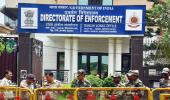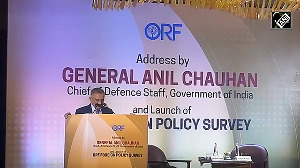The Supreme Court said on Wednesday it will examine whether its 2022 verdict upholding the Enforcement Directorate's (ED) powers to arrest and attach property involved in money laundering under PMLA required any reconsideration.

A special bench headed by Justice Sanjay Kishan Kaul said the remit was "limited" as a three-judge bench had already addressed some issues related to the Prevention of Money Laundering Act (PMLA).
"The issue now is whether anything requires reconsideration," said the bench, also comprising Justices Sanjiv Khanna and Bela M Trivedi.
The bench noted the objection raised by Solicitor General Tushar Mehta, representing the Centre, that an "academic exercise should not be carried out without there being substance and merely because someone approaches the court and wants the issue decided by a three-judge bench to be revisited. It should not be an occasion to revisit".
The top court was hearing a batch of pleas seeking reconsideration of the July 27, 2022 verdict by a three-judge bench on certain parameters.
In its last year's verdict, the top court had upheld the ED's powers of arrest, attachment of property involved in money laundering, search and seizure under the PMLA.
During the hearing on Wednesday, Mehta deprecated reconsideration of the 2022 verdict. "I am on the misuse and abuse of process of law," he said.
The bench told him that after hearing the parties, if it feels there was no need for reconsideration on any aspect, it may not revisit the verdict.
The bench spoke about how matters are referred to larger benches for reconsideration.
"If three judges feel some aspect requires reconsideration, we may refer it," it said.
"Can one file a petition tomorrow and say I don't agree with the same-sex marriage judgement? Can it be referred to a larger bench?" Mehta asked.
He said PMLA is not a "standalone offence" but a piece of legislation prepared in conformity with the recommendations of the Financial Action Task Force. FATF is the global money laundering and terrorist financing watchdog.
Mehta said FATF conducts mutual evaluation and seven members from different countries come and see if the anti-money laundering law is in tune with global standards. He said a country is graded after evaluation.
"Your lordships may await the evaluation otherwise there may be serious implications for the country," Mehta said, adding, "It may be in national interest to wait for a month."
He also asked whether a petitioner can approach a three-judge bench and challenge the same provisions on which another three-judge bench has already delivered a verdict.
"We are the final court. If there is a view taken and somebody says it may be reconsidered, it can be looked into," the bench said, adding, "We are not at all assuming that the judgment is not correct."
When Mehta said it was not an academic exercise and one has to be "alert and alarmed", Justice Kaul responded, "I have said I am alert, but not alarmed."
Senior advocate Kapil Sibal, appearing for one of the petitioners, referred to some broad issues including that the apex court had said in its 2022 verdict that PMLA is not a penal statute.
"How is it (PMLA) not a penal statute?" he asked and added people are convicted and sentenced to jail for the offence of money laundering under the Act.
Sibal said another issue was when a person is summoned by the Enforcement Directorate, it is not known whether he or she has been summoned as an accused or as a witness.
He asserted the statute is not in consonance with the Constitution.
The bench, while observing that it may not be possible to hear so many petitions in the matter, asked the petitioners' side to have two lawyers who would argue for them.
It appointed advocate Sumeer Sodhi as the nodal counsel for the petitioners' side. Similarly, the bench also named another advocate who would be the coordinating counsel for the respondents.
The bench posted the matter for hearing on November 22 and said counsel for the parties may file short synopses of five pages each.
It also noted that a petition seeking review of the July last year verdict is pending in the top court.
"I have always believed things can be argued pleasantly," Justice Kaul said at the fag end of hearing, adding, "I will not let anyone control my court."
In August last year, the top court had agreed to hear a plea seeking a review of its July 2022 verdict and observed that two aspects -- not providing an Enforcement Case Information Report (ECIR) and reversal of the presumption of innocence -- "prima facie" required reconsideration.
The Supreme Court had in its 2022 judgment said ECIR filed by the ED cannot be equated with an FIR, and providing a copy of it to the person concerned in every case is not mandatory. The presumption of innocence is a traditional principle of Indian criminal law where an accused is presumed innocent until proven guilty. The reversal of presumption of innocence, on the other hand, makes it incumbent upon the accused to prove his innocence.
In its judgment, the apex court had upheld the validity of certain provisions of the PMLA, underlining it was not an "ordinary offence".
The bench had said authorities under the Act were "not police officers as such" and the ECIR cannot be equated with an FIR under the Code of Criminal Procedure (CrPC).
It had said supply of an ECIR copy in every case to the person concerned was not mandatory and it was enough if ED, at the time of arrest, discloses the grounds of such arrest.










